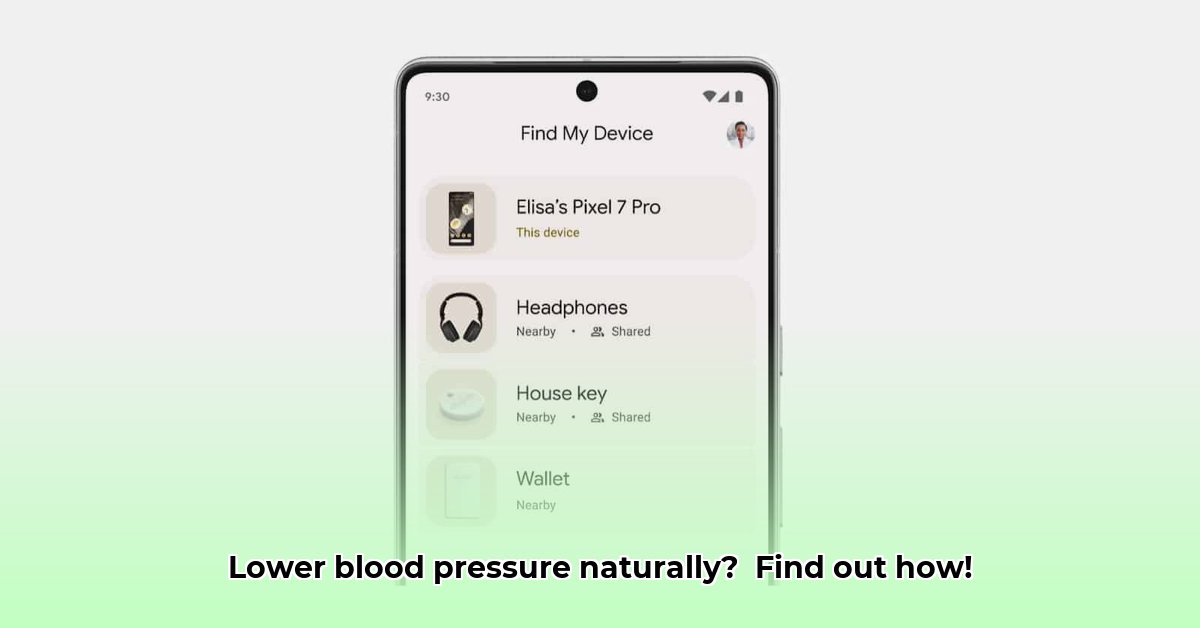
Home Remedies to Reduce High Blood Pressure
High blood pressure, or hypertension, is a common condition that often shows no symptoms, yet significantly increases your risk of heart disease and stroke. While medication prescribed by your doctor is often necessary, making positive lifestyle changes can significantly help manage your blood pressure. This guide provides practical, evidence-based steps to complement your doctor's care, empowering you to take control of your health. Remember, this information is for educational purposes and should not replace professional medical advice. Always consult your doctor before making significant changes to your diet or exercise routine.
Dietary Changes: Eating Your Way to a Healthier Heart
Your diet plays a crucial role in managing blood pressure. The DASH (Dietary Approaches to Stop Hypertension) diet is a well-researched approach that emphasizes specific food groups.
Step 1: Cut Back on Salt (Sodium). Processed foods, takeaways, and salty snacks are often loaded with sodium, a major contributor to high blood pressure. Aim for less than 2,300 milligrams (mg) of sodium a day, ideally even less as advised by your doctor. Carefully check food labels; you might be surprised by how much hidden salt there is!
Step 2: Increase Potassium Intake. Potassium helps counterbalance the effects of sodium. Include potassium-rich foods like bananas, potatoes (with the skins!), spinach, and beans in your daily diet.
Step 3: Magnesium for Relaxation. Magnesium helps relax blood vessels, which can lower blood pressure. Good sources include almonds, dark chocolate (in moderation!), and leafy green vegetables.
Here's a quick guide to some delicious, blood pressure-friendly options:
| Food Group | Examples |
|---|---|
| Fruits | Berries, bananas, apples, oranges |
| Vegetables | Spinach, kale, broccoli, carrots, sweet potatoes |
| Grains | Whole-wheat bread, brown rice, oats |
| Proteins | Lean chicken/fish, beans, lentils, tofu |
| Healthy Fats | Olive oil, avocados, nuts (in moderation) |
Get Moving: Exercise for a Healthier Heart
Regular physical activity is vital for lowering blood pressure. It strengthens your heart, improves circulation, and helps maintain a healthy weight.
Step 1: Aim for at Least 150 Minutes of Moderate-Intensity Exercise Weekly. This could be brisk walking, swimming, cycling, or any activity you enjoy. Split it into smaller sessions if that works better. Isn't it amazing how much a 30-minute walk can energize and de-stress you?
Step 2: Incorporate Strength Training Twice a Week. Strength training builds muscle, boosting your metabolism and aiding weight management. Bodyweight exercises or resistance bands are great options.
Step 3: Listen to Your Body. Start slowly and gradually increase intensity. Remember, consistency is key, not intensity.
Stress Less, Live Better: Stress Management Techniques
Chronic stress significantly impacts blood pressure. Learning to manage stress is crucial.
Step 1: Deep Breathing Exercises. Find a quiet space, close your eyes, and practice slow, deep breaths. Inhale deeply, hold for a few seconds, and exhale slowly. Repeat for several minutes.
Step 2: Mindfulness and Meditation. Focus on the present moment. Even short periods of meditation (5-10 minutes daily) can be beneficial. Many guided meditation apps are available.
Step 3: Yoga or Tai Chi. These gentle exercises promote relaxation and stress reduction.
Other Lifestyle Tweaks for Lower Blood Pressure
Prioritize Sleep: Aim for 7-9 hours of quality sleep nightly.
Limit Alcohol Consumption: If you drink, do so in moderation. Consult your doctor for personalized guidelines.
Quit Smoking: Smoking dramatically increases heart disease risk. Seek support to quit.
Monitoring Blood Pressure: Staying Informed
Regularly monitoring your blood pressure at home helps track progress and identify potential issues. Discuss monitoring frequency and target blood pressure ranges with your doctor. Remember, home monitoring is a supplement to, not a replacement for, regular medical check-ups. Seek immediate medical attention if you experience significant changes or symptoms like chest pain.
Conclusion: A Holistic Approach to Blood Pressure Management
These home remedies are valuable tools for better heart health, working best when combined with regular check-ups and any medication prescribed by your doctor. Partner with your healthcare provider to create a comprehensive plan for managing your blood pressure effectively. Remember, small changes can have a big impact on your well-being.